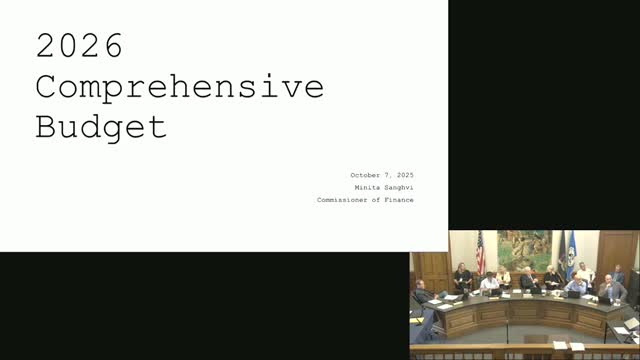Finance commissioner proposes 2% property-tax increase, hiring freeze in Saratoga Springs 2026 budget
Get AI-powered insights, summaries, and transcripts
Subscribe
Summary
At the City Council's October meeting, the commissioner of finance presented a $61.37 million proposed 2026 comprehensive budget that includes a 2% property-tax increase, recommends a hiring freeze and identifies options to close an estimated shortfall including increased paid parking, removal of a charter tax discount and using reserves.
The commissioner of finance presented the proposed 2026 comprehensive budget to the City Council at the October meeting, proposing a 2% property-tax increase and recommending a hiring freeze as the city contends with rising personnel, insurance and retirement costs.
The budget presentation, required by the city charter, laid out a $61,370,000 comprehensive budget that the commissioner said balances with a 2% tax levy increase and $1.5 million drawn from reserves. The commissioner said the council must adopt a final budget by Nov. 30 under the charter and scheduled two public hearings on the proposal for Oct. 21 and Nov. 5.
The commissioner of finance said personnel and benefit costs are the main drivers of the increase: the city’s full-time workforce grew from 315 in 2021 to 361 today, retirement expenses rose from $4.4 million in 2022 to $8.2 million in the 2026 proposal, and health insurance increased from $7.8 million to about $9.9 million. Liability insurance rose from $834,000 in 2022 to $2.4 million in the proposed 2026 budget, a change the commissioner described as “188%.” The commissioner said those cost increases, plus steady or only modestly rising revenues, make continued headcount growth “not sustainable” without new revenue sources.
To limit spending growth, the finance commissioner recommended an immediate hiring freeze, cuts to part-time positions and vacant roles, reductions to overtime and lower nonprofit grant allocations in the mayor’s office. The presentation noted the requested budget — before the commissioner’s reductions — would have been roughly $70 million and was revised down to the $61.37 million comprehensive budget.
The proposal assumes new or expanded nonproperty revenues if they materialize: a short-term rental registry and its registration/inspection fees (the commissioner included $150,000 conservatively but noted the portal is not yet open), cannabis tax proceeds in their first full year, and potential additional occupancy-tax revenue if the state bill enabling collection on short-term rentals is signed. The commissioner said the county and state legislative changes around occupancy tax limited how much the city was able to capture this year and that an earlier proposed local increase to occupancy tax did not carry in the final state legislation.
The finance office offered optional revenue and expense measures the council could consider during the amended budget process: expanding paid parking seasonally (April 1–Oct. 31) with revenue directed to DPW, increasing fees for concessions/outdoor dining/special events and pursuing a local law to remove a charter tax-discount (a 2.25% discount currently given for early payment) to free up about $280,000 net of anticipated tax anticipation note costs, and reassessment (the commissioner estimated a reassessment would cost about $7 million and would reallocate tax burdens rather than raise revenue). The commissioner also described the Community Preservation Fund — a local real-estate transfer tax used elsewhere for open space and climate initiatives — as a longer-term option that cannot be implemented within months.
The commissioner said the comprehensive budget incorporates $500,000 from restricted reserves and $1 million from unassigned fund balance, for a total of $1.5 million. The proposed capital budget was trimmed from the initial wish list to $2.25 million for 2026, with specific deletions noted (a snowplow and a high-cost mower) and use of an existing parking-facilities reserve to reduce new borrowing. The presentation stated the city maintains an AA+ credit rating and a “no fiscal stress” designation from Standard & Poor’s despite the pressures described.
Council members and other officials asked detailed questions during the presentation about fund-balance levels, the constitution of “other revenue” (fees, intergovernmental charges, permits), the visibility of sales tax tied to short-term rentals and whether the comprehensive budget as presented will cover contractual obligations with labor unions. The finance commissioner said the current comp budget is sufficient to cover contractual obligations as presented but stressed that the office achieved that by cutting vacant positions, part-time staff and overtime; the commissioner also noted the city is negotiating police and fire labor agreements that expire in 2025 and expects final agreements with four unions in 2026.
No formal council votes were taken during the hearing. The commissioner urged council members to review options ahead of the amended budget and said the council’s choices — for example whether to adopt the higher tax cap of 4.53% allowed this year under the tax-cap calculation (which the presenter estimated would add about $620,000) or to keep the 2% levy — would determine how deeply departments or nonprofit programs would be cut or restored.
Public hearings and a series of budget workshops were scheduled: Oct. 14 (mayor/civil service), Oct. 16 (public works/recreation), Oct. 21 (accounts/finance at 6 p.m.), Oct. 30 (public safety at 2 p.m.) and the two public hearings Oct. 21 and Nov. 5. The finance commissioner said the council will adjust figures in the amended budget if anticipated revenues such as short-term rental receipts or a signed occupancy tax bill materialize.
